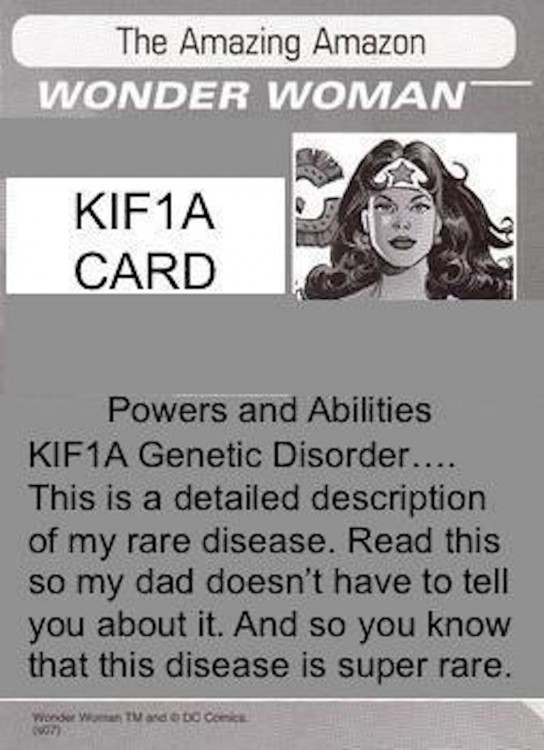Parenting a kid with special needs requires a lot of writing. It seems like I’m constantly writing, which is OK because… well, I’m a writer. Sitting at my desk typing this blog post is far less stress-inducing than the painful daily scribble that comes along with a rare genetic disorder.
Early Intervention requests; reminders that doses changed because of a seizure yesterday; letters to the mayor about the ramp our building is stalling on; financial aid applications; thank-you notes to therapists; Christmas cards in February; invoices from the Tooth Fairy; camp registration and so on. By far the most difficult rare disease writing assignment is filling out new doctor registration forms.
That damn clipboard with the same old questions. Like so many diseases, these registration forms have a progressive course and deteriorate rapidly. Every epic page hurts even more.
Page One is harmless: Date of birth. Address. Phone number. Name of pediatrician. Emergency contact.
Page Two gets harder: Insurance. Siblings. Allergies. School… Thank God DOB was on page one because I’m already so stressed I can’t remember our daughter’s birthday – forget about her social security number.
Page Three makes me sweat profusely. The most difficult section: “Pain on a scale of one to 10.”
I hope it’s closer to a four today. I know it’s not a one. Two would be nice but she’s having tiny seizures and her eyes hurt. Last night she woke up in a spastic episode, so this morning her legs are cramped. She was vomiting so her chest is sore and she had a bad fall this morning… I don’t know, seven?
It’s excruciating to imagine our daughter’s pain. Luckily she’s way stronger than me. She’s a superhero. Like all superheroes, Susannah just smiles and waves at every passing baby. Sitting on the puffy, vinyl waiting room chair she looks like a movie star riding on a float in the Thanksgiving Day Parade.
Page Four: Infuriating. Two lines underneath the question “What brings you here today?” Then another two lines at the bottom for me to list “Other medical problems.” Two lines? If your kid has a rare disease associated with 50 different conditions, you need a card. A Rare Disease Card. I am armed with a KIF1A card everywhere I go. I am a card-carrying member of KIF1A.

These cards are amazing. I’m a happier person because of my card. Secretaries don’t hate me and ER visits don’t take five hours thanks to my shiny new card. First responders will save my kid’s life because that card explains the neuropathy making her insensitive to pain. A laminated card (written by somebody far more eloquent and informed than I am) explains everything one needs to know about a rare genetic mutation and what to do when something happens.
It takes 15 minutes for me to briefly explain Susannah’s rare disease. Usually I can’t get through the conversation without crying – which adds another five minutes to my incoherent rambling. It’s difficult to articulate her condition because the genetic anomaly stopping Susannah from walking is an elusive mystery without a name. Her condition is referred to as a KIF1A-related disorder caused by a mutation in her KIF1A gene. Susannah’s previously unreported genetic mutation is rarer than rare.
Thank God for my KIF1A card! I love my card so much that I carry five in my wallet, 12 in my bag and Susannah always has one in her pocket. Every family member, teacher, babysitter, friend – they all have Susannah’s Rare Disease Card. When I walk into a new doctor’s office and that secretary hands me a clipboard, I just clip my Rare Disease Card onto the form and hand it right back. New school or camp? No problem. My consent form isn’t an illegible novel – it’s a prewritten baseball card stapled to the front. In the middle of the night when her body is as stiff as a board and I’m carrying her into a crowded emergency room, that little card lets me massage her legs instead of filling out a form.
Thanks to my Rare Disease Card, Susannah won’t see the desperation in my face when I stumble through a foggy explanation of her neurodegenerative condition. Silly as it sounds, that ever-present fear goes away for one fleeting moment as I scoop her up, kiss her face and hand somebody that card. Thanks again, card.
Our incredible social worker is there for us every single day. She walked us through Medicaid and helped us get Susannah into school. She spent hours on the phone with insurance companies so we could take a breath and remember to sleep. When I have no idea what to do next (daily) she answers the call. She is our generous navigator and Susannah’s relentless advocate. And she gave us a KIF1A card. A card that protects Susannah from seeing how terrified I am whenever I talk about the disease with no name. When somebody asks what’s “wrong” with my daughter, I say, “Absolutely nothing, she’s a superhero” and hand them the card.
This blog was originally published on KIF1A: A Blog About Superheroes.
We want to hear your story. Become a Mighty contributor here.
Thinkstock photo by Vasiliy Koval

